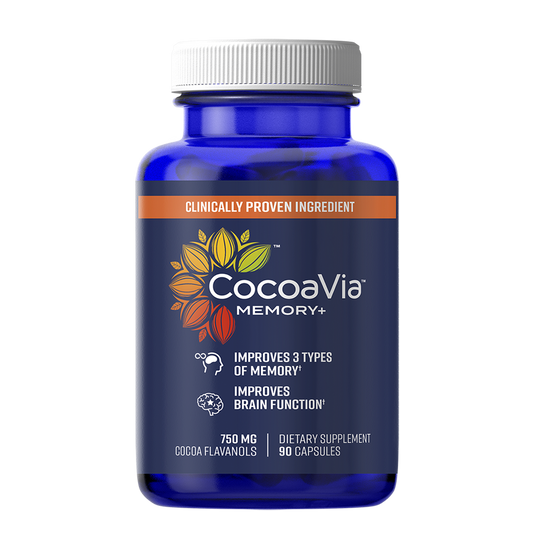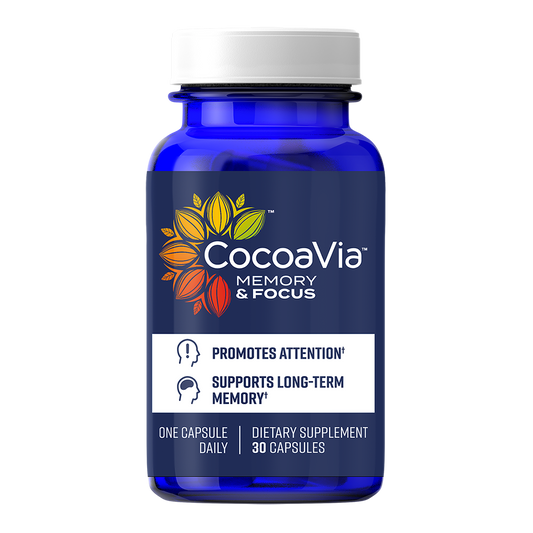
The Best Supplements for Brain Fog
-
Key Takeaways:
- Brain fog is a non-medical term sometimes used to describe a temporary cognitive decline—things like being forgetful, distracted, or taking longer than normal to remember things.
- Not getting enough sleep, not eating well, stress and dehydration can be contributors to feeling “foggy.”
- There’s a link between heart health and brain health, so it pays to do your best to keep them both in tip-top shape.
- Getting regular exercise can help you rest better at night, give your heart a workout, and sharpen your cognitive skills—a three-for-one deal!
- Taking steps to destress—like meditating and socializing—can help with brain health, too.
- Challenging your thinking by learning new things can trigger your brain to produce new neurons—literally.
- Cocoa flavanols have been proven to improve cognitive function and supplements like CocoaVia™ are a way to get 500 mg in one serving!
-
We’ve all had that strange feeling—you know, that sense you’re forgetting to do something important but can’t remember what. Or maybe there’s a word on the tip of your tongue but you can’t quite call it up. Then there’s the perennial favorite of walking into a room for one specific thing—too bad you can’t remember what that specific thing is.
These occasional lapses in mental sharpness can leave you feeling frustrated and maybe even a little alarmed—and wondering if there’s a bigger issue at play.
If you’ve ever wondered whether you should alert friends, family and co-workers with your own “(brain) foggy conditions ahead” warning, read on—there are things you can do to help lift the fog and sharpen your horizon!
Before we talk supplements for brain fog, let’s do our best to define what it is—and what it’s not!
What is brain fog?
First, brain fog is not a medical condition. It’s more of a feeling—a feeling some describe as not being as quick or sharp as usual when they’re performing cognitive tasks.
Much like the fog we occasionally encounter outside, brain fog is a temporary condition that fades away and pretty soon you’re back to your normal self. But even temporary feelings of brain fog can be frustrating. So what’s making this happen (and can we make it stop)?
What causes brain fog?
Since brain fog is a temporary decline in cognitive function, there are a few factors that might be causing that fuzzy feeling in your thinker. Here are a few:
You’re tired.
Not getting enough zzz’s can make you more forgetful and more likely to make mistakes. According to Sleep Education.org, adults need at least seven hours of sleep every night to stay sharp and think clearly during the day!
You’re hungry or thirsty.
More specifically, your body is hungry for something healthy to eat or you’re dehydrated–or both. According to Harvard Health Publishing, what you eat directly affects the structure and function of your brain. Eat well and stay hydrated—there’s a connection with hydration and brain function—and your brain will perform better!
You’re alive.
Really! There are so many times in life when it’s fairly common to process things a little slower than you normally would: pregnancy, menopause, even some medications can cause that fuzzy feeling. Add a busy family life, a particularly stressful time at work, or caring for older parents, and being more distracted than usual is to be expected! That said, there are some medical conditions that can cause brain fog, so even if you think yours is easily explained, talk to your doctor if you’re concerned.
What are the symptoms of brain fog?
Temporary decline in cognitive function may show itself differently in different people—it may even show itself differently in you on different days! But here are a few things you can consider as possible signs you’re “foggy”:
- Taking a few extra beats to remember things you usually remember quickly: words that are right on the tip of your tongue, for example.
- Having trouble concentrating on a task.
- Getting stuck trying to recall the next step in your grandmother’s spaghetti recipe—even though you’ve cooked it from memory a thousand times.
- Recognizing a familiar face … but forgetting the person’s name. Knowing you need to grab five items from the grocery store but only remembering four (psst—it’s probably milk. Or bread.)
Good habits to reduce brain fog
Lucky for us there are a few things we can do to help lift the “fog”!
Get better sleep
Like we mentioned, not getting enough quality rest can impact your cognitive function. Work these strategies into your routine to prep for super slumber:
- Create a bedtime ritual! Bedtime routines aren’t just good for toddlers—the American Heart Association says setting an alarm for bedtime, reading before bed, and taking time to destress (bubble bath, anyone?) can lull you into a deeper sleep.
- Eliminate blue screens well before bedtime—smart phones, computers, e-readers. Just a few tech tweaks can make all the difference on getting better rest!
- Watch the caffeine. Too much too close to bedtime can keep you tossing and turning. Sleep experts say drinking caffeine past noon can keep you revved up when it’s time to nod off, so get your last java or tea jolt before lunch!
Stress less
Easier said than done, right?! But stress can make you feel distracted and “foggy,” so eliminating some stress where you can is worth it. Try these stress reducers:
- Get out. A stroll in nature reduces stress and anxiety!
- Connect with friends. Whether in person or on a video call, socializing reduces stress—and so does a good belly laugh, so even better if you buddy up with your funny friends!
- Meditate. Not only can meditation reduce your stress levels, it can improve well-being and quality of life. There’s even some promising research that it can slow the cognitive effects of aging!
Exercise
One thing you definitely want to remember to keep your mind sharp now and later: exercise! Higher fitness levels have been linked to better attention, learning, working memory and problem solving. So whether you’re inside or out, squeeze in a workout—not only is it a known stress reducer, exercise also sharpens your cognitive skills! Just don’t work out too close to bedtime—it might keep you awake (see above about the importance of sleep!)
Play mind games
Just not the type you see on TV reality shows. Learning triggers new neurons and helps keep your brain sharp, so introducing new things like a tricky puzzle is key to keeping your brain healthy. It can be as simple as listening to new music or as challenging as learning a new language—anything that challenges your noggin’ to something new can help keep your brain performing its best!
The best supplements for brain fog
The experts agree: a healthy diet is the best way to make sure you’re getting all the nutrients you need. But if you want to, well, supplement what you’re eating, here are a few to consider:
Cocoa flavanols
Cocoa flavanols have been shown to improve cognitive function, and there’s solid evidence, including many studies, to back this up. In fact, one of these studies provides evidence that regular consumption of cocoa flavanols can reduce some measures of age-related cognitive dysfunction, suggesting that the habitual intake of flavanols can support healthy cognitive function with age. To get a guaranteed 500 mg of cocoa flavanols in one serving, try CocoaVia™ cocoa flavanol supplements!
Omega-3/DHA
There’s some research suggesting Omega-3/DHA might help with cognitive function, and we know it helps your heart. And according to the American Heart Association, there’s a link between a healthy heart and healthy brain! Our bodies don’t make the fatty acids in Omega-3, so diets and supplements are key to getting plenty.
B vitamins
There’s some research suggesting Omega-3/DHA might help with cognitive function, and we know it helps your heart. And according to the American Heart Association, there’s a link between a healthy heart and healthy brain! Our bodies don’t make the fatty acids in Omega-3, so diets and supplements are key to getting plenty.
Choline [AD3]
Choline is an essential nutrient for our bodies, and there’s research that indicates it may improve cognitive performance, which is particularly important as we age. While you can get choline in an assortment of foods including eggs and chicken, there are also dietary supplements available.
Choline [AD3]:
Ginkgo is an extract made from the gingko biloba tree. People take it for a variety of health reasons, mostly to improve brain function and memory according to the NIH Institute of Environmental Health Sciences. The jury’s still out on Gingko biloba and cognitive function, but the NIH National Center for Complementary and Integrative Health offers more information on its website on the herbal supplement.
Remember (pun intended!): the best way to get what your body needs to perform its best is by eating healthy foods, but supplements are a great way to fill in the gaps!
Try CocoaVia™ Brain Health Cocoa Flavanol Supplements
-
CocoaVia™ Memory+ Supplement
Improve your memory in just 8 weeksRegular price From $53.99 $1.79 per dayRegular price Sale price From $53.99 $1.79 per dayUnit price / per -
CocoaVia™ Memory & Focus Capsule
Keeps you focused & boosts memoryRegular price From $49.99 $1.66 per dayRegular price Sale price From $49.99 $1.66 per dayUnit price / per



